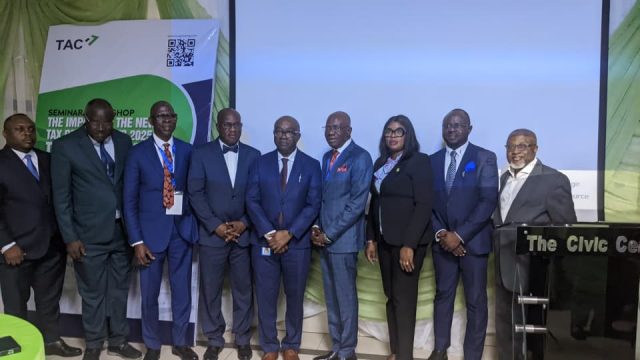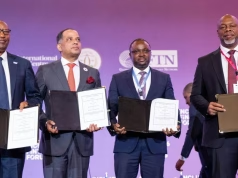
The Tax Administration Act 2025, Nigeria’s most comprehensive fiscal overhaul in decades, is set to redefine the country’s investment landscape as financial institutions, regulators, and corporate leaders brace for full implementation within the next three months.
At a high-level policy forum convened by TAC Professional Services, stakeholders from across Nigeria’s financial ecosystem gathered to assess the sweeping implications of the new law—a unified framework designed to modernize tax administration, enhance transparency, and strengthen the nation’s appeal to domestic and foreign investors.
“This is not just another policy shift,” warned Mr Tunde Adaramaja, CEO of TAC Professional Services, who opened the discussion with a call to action. “It is a structural recalibration of Nigeria’s financial architecture.” He emphasized that compliance alone would not suffice. “There will be no hiding place once these laws take effect,” he said. “We must anticipate risks, seize opportunities, and actively shape future policy.”
Backed by data showing renewed investor interest—Foreign Direct Investment (FDI) rose from $377.4 million in 2023 to $674.7 million in 2024, while Foreign Portfolio Investment (FPI) surged from $1.15 billion to $8.3 billion—the reforms come at a pivotal moment. Yet experts caution that much of this capital reflects “hot money” chasing high yields rather than deep confidence in systemic stability.
“The real test isn’t whether capital flows in,” one panelist noted. “It’s whether it stays. That requires predictability, transparency, and coherence across all economic policies.”
A Strategic Lever for Growth
Representing the Securities and Exchange Commission (SEC), John Briggs, Head of SEC Lagos, delivered a keynote message on behalf of Director General Dr. Emomotimi Agama. “Nigeria is resilient and rich in potential,” he said. “But we are at an inflection point.”
He described the Tax Administration Act 2025 not merely as legislation, but as a strategic lever capable of transforming Nigeria’s capital markets into engines of inclusive growth—if effectively implemented. “The question now is not whether the law was passed,” Briggs added, “but whether it will catalyze sustained expansion or become another well-intentioned reform derailed by inertia.”
Major Changes at a Glance
The new Act consolidates over two decades of fragmented tax laws into a single, digitized, and enforceable system. Key provisions include:
- Corporate Income Tax: Retained at 30%, aligning Nigeria with regional peers like Kenya and South Africa (27%), though above Ghana’s 25%. Earlier proposals to reduce it to 25% were not adopted.
- Capital Gains Tax (CGT): Exemption threshold raised from ₦100 million to ₦150 million annually. Gains up to ₦10 million above this are also exempt; beyond that, a flat 10% rate applies. Notably, there is no automatic exemption for long-term holdings.
- Withholding Tax (WHT): Harmonized across transaction types to reduce ambiguity, though rates for foreign investors remain unchanged.
- Small Business Relief: Tax exemption threshold doubled—from ₦25 million to ₦50 million in annual turnover—aimed at formalizing micro-enterprises.
- Personal Income Tax: Individuals earning ₦800,000 or less per year are now fully exempt, a move to expand inclusion.
- Capital Loss Offset: Investors can now offset capital losses against gains, offering protection during market volatility.
- Performance-Based Incentives: Outdated tax holidays replaced with a 5% tax credit over five years for qualifying capital investments, extendable through reinvestment.
Institutional Transformation
A cornerstone of the reform is the transition from the Federal Inland Revenue Service (FIRS) to the Nigerian Revenue Service (NRS), a restructured agency with expanded operational reach and digital capabilities. Real-time reporting portals, automated assessments, and integration with global standards like the Common Reporting Standard (CRS) aim to improve compliance and transparency.
Dr Olabode Olatunji, Director, Large Tax Payers, Telecom& Financial Services Department FIRS), welcomed the consolidation. “We used to navigate dozens of overlapping statutes,” he said. “Now we have one coherent, slimmer document.” Unified filing, standardized audits, and eliminated redundancies, he argued, reduce friction and encourage voluntary compliance.
Further reforms are expected in 2026, including a proposed 15% tax rate on net profit before tax for select sectors—still under review.
IPO Momentum and Market Depth
The timing of the Tax Administration Act 2025 coincides with growing anticipation around major initial public offerings (IPOs). Following successful listings like MTN Nigeria and BUA Cement, market watchers expect NNPC Limited, Dangote Fertilizers, and potentially the Dangote Refinery to enter the NGX within the next few years.
Analysts project that if five of Nigeria’s largest unlisted firms list publicly, combined market capitalization could exceed ₦8 trillion, significantly boosting liquidity and attracting institutional capital.
Yet challenges remain. Retail participation in equities remains critically low—fewer than 3% of Nigerian adults invest in stocks—hampering broad-based wealth creation. Barriers include limited access, low financial literacy, and lingering distrust in market fairness.
“A vibrant capital market isn’t just about big IPOs,” one speaker stressed. “It’s about inclusion. Without broad ownership, wealth stays concentrated and markets lack resilience.”
Human Capacity Meets Digital Ambition
Despite optimism, experts warn that technology alone won’t guarantee success. Mr Saheed Bashir ( Managing Director Meristem Stockbrockers Limited), cautioned that human capacity must keep pace with digital transformation. “Sophisticated systems are coming,” he said, “but back-end infrastructure and skilled personnel must keep up.” He predicted early disruptions, especially in capital markets, where firms are scrambling to adapt before the implementation deadline.
“Initial challenges are inevitable,” Bashir said. “But they must not derail the long-term vision.”
The Road Ahead
The overarching goal of the Tax Administration Act 2025 is clear: position Nigeria as a credible, transparent, and competitive destination for global capital. By unifying tax policy, embracing digital tools, and aligning with international norms, the government aims to send a strong signal—Nigeria is open for business.
But as Briggs reminded the audience, tax reform cannot operate in isolation. “FDI is not just about numbers,” he said. “It’s about coherence. Stable monetary policy, predictable regulation, and rule-of-law governance must go hand-in-hand with fiscal reform.”
With major IPOs on the horizon, rising portfolio inflows, and a clearer tax regime, Nigeria may finally be laying the foundation for a mature, resilient capital market.
As Adaramaja concluded: “We are not just interpreting the law today. We are shaping the future of finance in Nigeria. The time for proactive, intelligent engagement is now.”
Follow us on Instagram.
https://www.instagram.com/businessnewsng?igsh=ZXpweTdjOGF1ZXduT
























